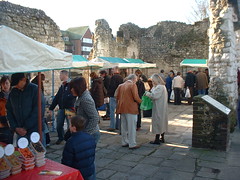
Come along to to our annual seed swap. We may be small but there are plenty of surprises.
With seeds, plants, gardening books and advice.
Why Become a Seed Saver?
Why? Seed saving is as old as gardening.
There was a time when gardeners considered seed from their favorites plants to be treasures well worth saving from year to year.
Why? Because you have a plant you love and want to grow again.
It could be the perfect blue campanula, the best tasting tomato or a champion pumpkin. You never know when a seed company will discontinue your favorite seed to make way for new varieties. Saving your own seed is the only guarantee.
If you like what you eat, save the seeds.
Why? To help safeguard our genetic heritage.
‘In the past 100 years we have lost over 90% of our vegetable varieties in the UK. Nowadays, just three corporations control a quarter of the world’s seed market, vying for power over the world’s food production and hybrid seeds (which cannot be seed-saved) are becoming commonplace in seed catalogues.
Why? Seed saving is something we can all do, and it does make a difference.
Faced with the overwhelming totality of environmental disasters – global warming, climate change, nuclear power, genetic engineering – it is difficult to know what we as individuals can do to make a difference. Change a few light bulbs, cycle to work. Seed saving is something you can do – and it does make a difference.
Why? It grows better
By collecting seeds and swapping them with other gardeners in your area you can grow things that like the conditions you have. It makes sense that if it grows well in your neighbour’s garden it will grow in yours and we all like to make things easier.
Why? To save money
Seed from catalogues can be expensive. Saving your seeds means that you get more for less.
Why? To help preserve our right to save seeds.
The industry continues to place more and more restrictions on farmers’ and gardeners’ right to save seeds. Variety patenting, licensing agreements, and restricted lists such as that maintained by the European Union, are industry tools to wrest control of the seed from the commons and keep it for themselves.











